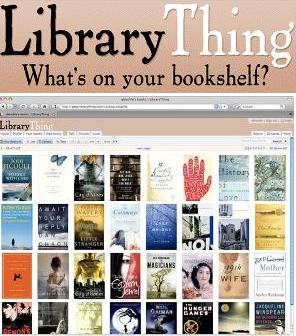 Amazon’s recent acquisition of Goodreads will likely have a ripple effect on other social media sites targeted at book lovers, with LibraryThing and Bookish potentially drawing membership from any defectors unhappy with the sale. Meanwhile, many Kindle owners will be introduced to Goodreads for the first time, as the site’s social media functions are integrated with Kindle devices.
Amazon’s recent acquisition of Goodreads will likely have a ripple effect on other social media sites targeted at book lovers, with LibraryThing and Bookish potentially drawing membership from any defectors unhappy with the sale. Meanwhile, many Kindle owners will be introduced to Goodreads for the first time, as the site’s social media functions are integrated with Kindle devices.
“Goodreads was fully independent…. it made them the natural allies of people who wanted to avoid the consolidation of the industry, in particular publishers,” LibraryThing founder Tim Spalding told LJ. “I have a lot of respect for Amazon. They’re a very smart company. But I’m personally worried about them controlling the entire book world, and it’s really kind of heading that way.”
The acquisition presents an opportunity for LibraryThing to build a stronger bond between publishers, independent booksellers, and the site’s 1.6 million users, he argued in a blog post shortly after last week’s sale was announced.
“Publishers are desperate to find a way out of the Amazon trap—needing Amazon, but also competing more and more with Amazon’s own publishing operations, and finding their individual and collective power declining as Amazon’s grows,” he wrote.
Spalding acknowledged that Amazon also owns a stake in LibraryThing, acquired when it purchased the popular online used bookseller Abebooks in 2008. (The company bought out social media site Shelfari the same year.) Abebooks had been a minority investor in LibraryThing prior to the acquisition, and Amazon has maintained its stake since the purchase.
However, reports that Amazon’s stake is as high as 40% of LibraryThing are inaccurate and fail to take into account that ProQuest affiliate Bowker is also a minority shareholder in the company, according to Spalding. He continues to retain majority ownership, but declined to disclose additional information about how shares of LibraryThing are divided.
Courting allies
Spalding predicts that that Hachette, Penguin, and Simon & Schuster will redouble their efforts with their joint venture Bookish.com, and noted that publishers were also demonstrating renewed interest in LibraryThing.
“We’ve already seen publishers writing us and saying ‘we want to leave the Goodreads early reviewers program [First Reads] and go back into yours,” he said.
As an industry observer, Spalding said he is most interested in how the Goodreads service will be integrated with Kindle e-readers and apps.
“The downside of that is that e-readers [as dedicated platforms] are inherently monopolistic,” he said. “The technology just lends itself to concentration. This just underscores that. But sharing is so much easier when you don’t have to type anything in…. I’m of mixed opinion about it myself. But [integrating social media into an e-reader] needs to be tried, nobody has tried it, and I think that they have a real opportunity there. I’m excited to see what they can do.”
Overall, Spalding sees little downside for LibraryThing as a result of the acquisition. Goodreads already had the largest user base, by far, in this segment of social media, and LibraryThing had continued to draw steady traffic and sell software to libraries including LibraryThing for Libraries, LibraryAnywhere, and BookPsychic. The acquisition by Amazon does give Goodreads additional heft, along with a new marketing platform in the Kindle, but independent startup companies often slow down once they are acquired and integrated into much larger corporations, he noted.
Many LibraryThing members also have accounts with Goodreads, and use the services for different purposes, Spalding said.
“They’re not fully competitors. A common use pattern is to use Goodreads as ‘here’s what I’m reading now,’ posting that to Facebook and interacting socially. And then LibraryThing is where you store your whole library. We have a lot of users who do that.”


Why would Bookish gain members from Goodreads? There is no reason to join; it is not a community. It’s far more of an ebookstore spawned by 3 publishers’ marketing dept.
And how can you describe it as a social media venture? It’s not:
http://www.the-digital-reader.com/2013/03/30/theres-a-reason-that-no-one-in-publishing-bought-goodreads/
Hi, Nate
Thanks for writing. I agree that Bookish is underdeveloped as a social media platform, and is primarily focused on recommendations and e-commerce at this point. The article focuses primarily on the opportunities for LibraryThing. However, I agree with Spalding, who notes that the publishers involved with Bookish may feel a new urgency to focus on that venture now that Goodreads is no longer independent.
And from an e-commerce standpoint, it’s tough to imagine that Goodreads will still be helping users purchase books through anyone but Amazon in a year or two. Just speculating that anyone who is unhappy with that (or other aspects of the sale) will likely turn to an alternative recommendation site that includes social media/sharing functions.
Amazon owns 40% of Library Thing so if people are leaving Goodreads because they hate Amazon then they hate 40% of Library Thing.
Hi, Troy
Thanks for the comment.
LibraryThing founder Tim Spalding says that the 40% figure being cited everywhere lately is inaccurate. Abebooks bought a 40% stake in LibraryThing in 2006. Amazon then bought Abebooks two years later. Then, in 2009, the Cambridge Information Group became the second minority shareholder in LibraryThing and made a distribution deal for libraries with their subsidiary Bowker. None of these companies have disclosed how the shares changed hands in those transactions since the initial purchase in 2006, but Spalding remains the majority shareholder and controls the business.